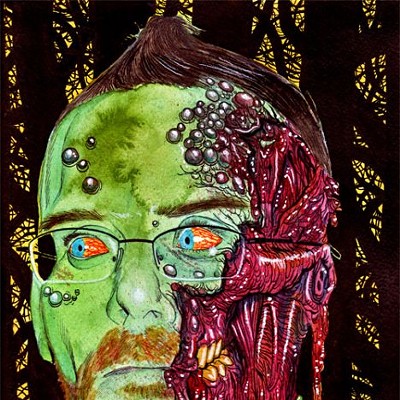Plenty has been said about the mainstreaming of geek culture — I reference it all the time, myself — and it’s easy to see why. Superhero movies everywhere. Grown men and women in business-casual reading Harry Potter on the bus. Ads for video games during everything from football games to prime-time sitcoms. The evidence is easy to find without even looking — but really, how far down the geek rabbit hole has the world actually gone?
In the case of films and television, the assimilation of geekdom is broad and relatively deep. Take away Titanic and maybe Furious 7, and every one of the ten top-grossing movies of all time is science fiction or fantasy (that includes comic-book movies, which are usually both). That’s not bad, even if those films don't win a lot of Oscars. Television is overrun with geek fare as well, if to a lesser degree. Again, science fiction and fantasy comprise some of the most popular shows of the past decade as well as many of the critical darlings and cult favorites, from Game of Thrones to Lost to The Walking Dead to pretty much everything the CW does anymore.
These movies and shows do well not just with self-identified geeks, but with just about everyone, as reflected in ratings and revenues and the fact that the industry just keeps churning them out. There are limits — just because that guy at your office admits he binge-watched three seasons of Doctor Who on Hulu, he probably does not want to borrow your Blake’s 7 DVDs — but it’s impossible to deny that geek culture is currently mainstream culture in the world of film and television.
Moving to a domain that was once the exclusive domain of geeks, the picture gets a little murkier. If you follow any degree of media reporting, you will certainly have heard that video games have been challenging Hollywood as the top revenue generator for years. Even if you don’t own a gaming console or play any games yourself — an increasingly unlikely scenario — you certainly know people who do, and chances are good that those people do not consider themselves either a geek or a gamer. Here’s the thing, though: With a handful of exceptions, the games that the mainstream plays are not “geek” games.
Yes, within the gaming subculture, we love our first-person shooters, and Grand Theft Auto is a universal language spoken by everyone who can stand its racism, misogyny and juvenile humor (so, basically, all Americans). Move beyond that, though, and there is a gulf between what gamers play and what the mainstream enjoys. The woman you carpool to work with might not be able to shut up about Angry Birds, but have you ever met a soccer mom who plays real-time strategy games? The dudes at the frat house line up to buy Madden on release day, year after year, and can even pull off a few head shots in Call of Duty, but ask them what their favorite Japanese RPG or 4X game of all time is, and they’ll call you a nerd and give you a wedgie to punctuate it. They may play games, but they aren’t exactly playing the games that gamers play, for better or worse.
Move into other games, and the gap is even more obvious. Sure, everyone knows what Dungeons & Dragons is in the abstract, but how many have ever rolled up a character, much less stuck with a campaign for months or even years? You can buy Settlers of Catan and Ticket to Ride at Target these days, but have you ever met anyone who’s actually done so?
Take another step down the rabbit hole and you can just forget it. Talk about LARPing to your friend who’s “totally obsessed with Game of Thrones!” and once you’ve explained exactly what that is, the best reaction you can hope for is a polite change of subject. Cosplay may earn plenty of slideshow views, but you’re still going to get some condescending laughter and catty comments if you tell your co-workers at Applebee’s that that’s how you spend most of your free time and money. You've seen every comic-book movie made in the last ten years, but when was the last time you actually, you know, read a comic book?
For now, interest in and appreciation for geek culture is neither broad nor deep, at least outside of film and television. Even in those arenas, there’s no reason to believe that the current infatuation is anything but that — a fleeting crush that could end in a heartbeat. Given time and the continued assimilation of the things we hold dear, this could well change. In the meantime, enjoy the attention and money some of our favorite things have attracted, and take what little measure of acceptance it might offer you for your own weirdness — but don’t get too attached. We could become just another has-been cultural niche in the blink of an eye.
Find me on Twitter, where I tweet about geeky stuff and waste an inordinate amount of time: @casciato.
[
{
"name": "Air - MediumRectangle - Inline Content - Mobile Display Size",
"component": "12017618",
"insertPoint": "2",
"requiredCountToDisplay": "2"
},{
"name": "Editor Picks",
"component": "17242653",
"insertPoint": "4",
"requiredCountToDisplay": "1"
},{
"name": "Inline Links",
"component": "18838239",
"insertPoint": "8th",
"startingPoint": 8,
"requiredCountToDisplay": "7",
"maxInsertions": 25
},{
"name": "Air - MediumRectangle - Combo - Inline Content",
"component": "17261320",
"insertPoint": "8th",
"startingPoint": 8,
"requiredCountToDisplay": "7",
"maxInsertions": 25
},{
"name": "Inline Links",
"component": "18838239",
"insertPoint": "8th",
"startingPoint": 12,
"requiredCountToDisplay": "11",
"maxInsertions": 25
},{
"name": "Air - Leaderboard Tower - Combo - Inline Content",
"component": "17261321",
"insertPoint": "8th",
"startingPoint": 12,
"requiredCountToDisplay": "11",
"maxInsertions": 25
}
]











